As always, you can easily get to the secure order form at our website by scrolling down to the very end of this column where you will see the order links. That’s the best way to order – or call. We’re happy to help and, as always, thank you sincerely for business sent our way.
Intentional. It’s a great word, but was hardly in our vocabulary a few decades ago. Like “coming alongside” someone or “loving on” them, it seemed faddish at first. Yet, those I knew who used it — some specialists in group processing and experiential education who read widely — were, well, intentional. If God was making “all things new” then they wanted to be open to God’s grace re-orienting everything and they worked for how that might be. They were people who did not allow their faith to develop willy-nilly (which is to say, haphazardly at best) or through some technique-laden, formulaic plan.
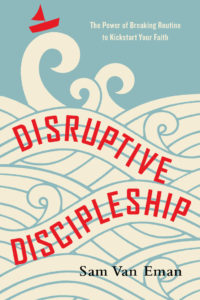 These friends eschewed both shallow sentimentality and harder-core manipulation. Still, they organized folks into groups (often in wilderness adventures) who learned to be honest about their lives (being authentic was another buzz word in those days) and somehow grew as real humans in a good if broken creation, reflecting a new identity in Christ. My friend Sam Van Eman writes a bit about some of this in his classic Disruptive Discipleship: The Power of Breaking Routine to Kickstart Your Faith (IVP; $17.00 / OUR SALE PRICE = $13.60.) He doesn’t overuse the word, but it’s a book about being intentional.
These friends eschewed both shallow sentimentality and harder-core manipulation. Still, they organized folks into groups (often in wilderness adventures) who learned to be honest about their lives (being authentic was another buzz word in those days) and somehow grew as real humans in a good if broken creation, reflecting a new identity in Christ. My friend Sam Van Eman writes a bit about some of this in his classic Disruptive Discipleship: The Power of Breaking Routine to Kickstart Your Faith (IVP; $17.00 / OUR SALE PRICE = $13.60.) He doesn’t overuse the word, but it’s a book about being intentional.
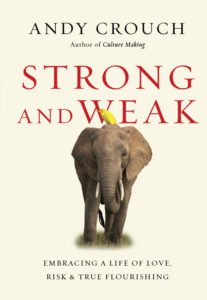 Andy Crouch, in his extraordinary, eloquent rumination on healthy change, Strong and Weak: Embracing a Life of Love, Risk and True Flourishing (IVP; $18.00 / OUR SALE PRICE = $14.40) also reminds us of how certain moves — intentional ones — can deepen both our capacity to risk while honoring our human limitations. The notion of being self-aware and setting some sorts of goals for our lives can be misused, wrangled into some straight-jacket of false security, but, still, understood well, intentionality is good.
Andy Crouch, in his extraordinary, eloquent rumination on healthy change, Strong and Weak: Embracing a Life of Love, Risk and True Flourishing (IVP; $18.00 / OUR SALE PRICE = $14.40) also reminds us of how certain moves — intentional ones — can deepen both our capacity to risk while honoring our human limitations. The notion of being self-aware and setting some sorts of goals for our lives can be misused, wrangled into some straight-jacket of false security, but, still, understood well, intentionality is good.
Which brings me to give a happy thumbs up to the brand new, self-help guidebook done by Holly and Glenn Packiam, The Intentional Year. I’m not sure I can take a whole year of being intentional but maybe you can. Wowza. Here we go.
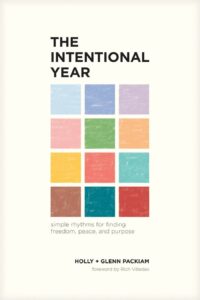 The Intentional Year: Simple Rhythms for Finding Freedom, Peace, and Purpose Holly & Glenn Packiam (NavPress) $16.99 OUR SALE PRICE = $13.59
The Intentional Year: Simple Rhythms for Finding Freedom, Peace, and Purpose Holly & Glenn Packiam (NavPress) $16.99 OUR SALE PRICE = $13.59
Allow me to briefly say just a few things about this good book that will set you at ease and, hopefully, help you see how it could be a life-saver for you or somebody you know.
First, The Intentional Year isn’t just for January, useful as it is this month; sure, some people make New Year’s resolutions, but many make resolves during Lent; any time in the calendar year we might face what seems like a momentous turn of events. Maybe it is a birthday or anniversary, a sudden awareness of a painful predicament, a new job or an old ailment or a new college major. Maybe it is just the realization that, as they put it, “the frantic pace of your life no longer needs to define you.” The Packiams invite us to choose to live on purpose, with intentionality. Any time is a good time to refresh our sense of things and set some new goals, to “embark on an intentional year.” Maybe buying this book now might become the nudge you need.
Secondly, this book is chatty — it reads nicely, with back-and-forth conversations between Holly (who holds a master’s degree in counseling and is a pastor of parenting ministry at New Life Downtown in Colorado Springs) and Glenn (who has his doctorate in theology from Durham University in the UK and has written rich books on liturgy, music, and worship and what nearly could be called a sacramental worldview. I really liked his Blessed Broken Given: How Your Story Becomes Sacred in the Hands of Jesus.) These two are evangelical church leaders who read very widely, draw on a remarkable array of resources, and yet live busy, complicated lives like many of us. They get us, they really do.
Glenn’s last book was one I raved about at BookNotes a few months back (The Resilient 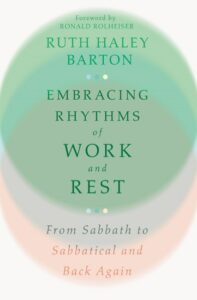 Pastor: Leading Your Church in a Rapidly Changing World) and his upbeat style of storytelling serves them well, here. Holly is a gem and we not only learn a bit about her mid-Western agricultural background, their current lives, raising four multi-ethnic kids at their home, and her practical spirituality. So the book is easy to read — fun, even. It would be a breezy and practical outworking, perhaps, for those who have read Ruth Haley Barton’s somewhat more spiritually intense Embracing Rhythms of Work and Rest: From Sabbath to Sabbatical and Back Again (IVP; $25.00 / OUR SALE PRICE = $20.00.)
Pastor: Leading Your Church in a Rapidly Changing World) and his upbeat style of storytelling serves them well, here. Holly is a gem and we not only learn a bit about her mid-Western agricultural background, their current lives, raising four multi-ethnic kids at their home, and her practical spirituality. So the book is easy to read — fun, even. It would be a breezy and practical outworking, perhaps, for those who have read Ruth Haley Barton’s somewhat more spiritually intense Embracing Rhythms of Work and Rest: From Sabbath to Sabbatical and Back Again (IVP; $25.00 / OUR SALE PRICE = $20.00.)
Thirdly, The Intentional Year is a book that calls us to be intentional about retreating for refreshment and renewal is and is what I will call wholistic, even if not fully comprehensive. That is, it focuses on five key spheres of our lives and how we must be thoughtful about God’s presence in those areas. These five spheres really do include a lot — from personal to public and much in-between — and they show the importance of each arena.
Here are the five chapter titles (in the central second part of the book) that explore the five “spheres”:
- Practices of Prayer
- The Power of Rest
- Pathways of Renewal
- Circles of Relationship
- Habits of Work
Again, The Intentional Year is written as a resource to help us focus on being more intentional, taking steps to work out some specific stuff in our real lives. I sometimes mock cheesy and formulaic self-improvement books, but this nicely invites us to spiritual practices and gentle habits that embody our deepest longings. They are trusted guides and wise (and honest about their foibles and the difficulties of some of this.) Yes, they’ve been reading Jamie Smith (like You Are What You Love) and they cite the cool popular science books about behavior change like Atomic Habits, but they are more at home quoting the Benedictine writer Esther de Waal or Vancouver’s Ken Shigematsu or, of course, Eugene Peterson. Contemplative as it may be (and, happily, there is a section about the importance of reading for personal depth), still, their guidance is directive and really practical. They talk about “connecting, sharing, and processing.” And they repeat it and tell some stories, lots of stories about this process. They invite us to “take inventory” and such. Holly and Glenn help us to (as it says on the back) “identify themes and callings and start to implement life-giving rhythms.”
They speak eagerly of their planning times where they discern the need for establishing rhythms for the next season. I’m lucky if I make a plan for the day. How about you? The last chapter is creatively called “Calendar Rules” and the double entendre has captured my attention. I know I’m not the only one who needs some encouragement about this sort of intentionality.
As their friend Rich Villodas writes in a very complimentary foreword,
As I read through this book, I was blown away by how much ground they cover in such little space. This is a book you can read rather quickly, and at the same time, it’s a book you will want to return to for years to come. Glenn and Holly offer beautiful theology, accessible spiritual practices, and a refreshing honesty that will put you at ease. Instead of wanting to “try harder,” you’ll walk away with a longing to order your life in a way that bears good fruit.
Instead of wanting to “try harder,” you’ll walk away with a longing to order your life in a way that bears good fruit.
They open the book with an epigram from John Lennon and his beautiful song “Beautiful Boy.”
Life is what happens… while you’re busy making other plans.
Indeed. Yup. This book can help. Order one today — or maybe more than one to share. It would be a blessing, I’m sure.
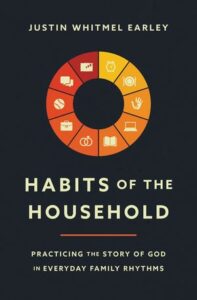 Habits of the Household: Practicing the Story of God in Everyday Family Rhythms Justin Whitmel Earley (Zondervan) $19.99 OUR SALE PRICE = $15.99
Habits of the Household: Practicing the Story of God in Everyday Family Rhythms Justin Whitmel Earley (Zondervan) $19.99 OUR SALE PRICE = $15.99
Okay, in many ways this is a sequel, for families, from his stellar 2020 release, The Common Rule: Habits of Purpose for an Age of Distraction (IVP; $20.00 / OUR SALE PRICE = $16.00.) That colorful, practical book stood as a beacon to me as a new sort of self help book. It got its start on the internet and uses graphs and charts, positive psychology and theological insights. Rooted in his own narrative of near-breakdown, he invites folks to give up certain things, and take up certain things — daily, weekly, monthly. This planner is one of the most hip and compelling resources we’ve seen.
Habits of the Household: Practicing the Story of God in Everyday Family Rhythms flows very naturally from that one, although one doesn’t have to read it first. It is more of the same, but a lot of new material, too. It has full color charts and little graphs full of ideas to reframe the story of your family. It invites us to quality time (in the internet age) and evokes new desires, new habits, new lifestyles. It’s sort of a self-help version of some of Jamie Smith’s key insights and offers some very practical handles on — shall I say it? — being intentional about the habits of our households. It’s the quality and calibre of a book that Andy Crouch has called “gold.”
As I said in BookNotes when we first premiered it about a year ago:
Ann Voskamp calls it “a gem of a book that I want to give to absolutely every family I know.” She continues, “Earley hands us transformational hope for every family with these practical and gospel-saturated pages. I couldn’t put it down.”
Earley hands us transformational hope for every family with these practical and gospel-saturated pages.
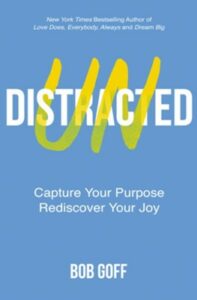 Undistracted: Capture Your Purpose, Rediscover Your Joy Bob Goff (Thomas Nelson) $26.99 OUR SALE PRICE = $21.59
Undistracted: Capture Your Purpose, Rediscover Your Joy Bob Goff (Thomas Nelson) $26.99 OUR SALE PRICE = $21.59
Bob Goff is celebrated as one of the most interesting characters and most interesting writers working today. I dare anyone to read a page or two and not smile with his wordplay and not be gripped by his stories. He has seen some stuff — some quite heavy, some nearly unbelievable, as good as the wild stuff Campolo used to talk about. He harnesses his passion (and whimsy) into well-crafted books such as Love Does and Everybody Always. They are fabulous.
A few years ago he developed a coaching business, mentoring hundreds through dreaming big, cooking up their own creative plans, mentoring others towards a godly purposeful sort of ambition. A book about that (certainly good for a new year) is called Dream Big: Know What You Want, Why You Want It, and What You’re Going to Do About It $26.99 / OUR SALE PRICE = $21.59.) I liked it a whole lot and have revisited it often, reading it at least twice.
In a way, Undistracted is a sequel to Dream Big, exploring the obstacles that are often in the way as we are distracted from our ambitions and goals. Naturally, he gives us great stories and examples and principles for overcoming these distractions and recovering a sense of purpose.
A year or so ago when it first came out I wrote this about it, and I still believe it:
We are distracted by our own fears and foibles. We are distracted by very real problems and limitations (Goff over and over acknowledges this, although his optimism could feel a bit dismissive if you feel called to lament and sorrow.) We are distracted by others who are intent on tearing us down; Bob gives good advice about not engaging with the cynics. We all have endless to-do lists and most of us scroll on our phones just a bit too much. The list of distractions, big and small, are endless.
Goff has an uncanny ability to make nearly anything a teaching moment. From some major heart problems to dashboard lights going out on a plane that he was solo night-flying to the story of a high school wood-shop teacher missing some fingers, this guy can turn anything into a parable. I grate against zippy bromides and chicken-soup-for-the-soul happy thoughts, but, again — even though Undistracted may seem a bit like that, with its pithy stories, life-lessons, urgent advice, and all those analogies and metaphors (the book is, he tells us, like those rumble strips along the side of the road, reminding you if your drifting off course) I could not put it down.
Props to him for the never-ending delight of finding lessons in nearly everything. He has good stuff to say and it is important stuff, even profound, even if he’s not too busy having fun and spinning his magic to say that it is. It is. As it says on the back cover, “Bob shows you the way back to an audaciously attentive life.”
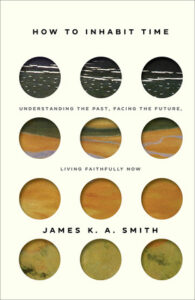 How to Inhabit Time: Understanding the Past, Facing the Future, Living Faithfully in the Now James K.A. Smith (Brazos Press) $24.99 OUR SALE PRICE = $19.99
How to Inhabit Time: Understanding the Past, Facing the Future, Living Faithfully in the Now James K.A. Smith (Brazos Press) $24.99 OUR SALE PRICE = $19.99
Okay, just to show that BookNotes doesn’t just recommend the accessible, fun, and easy-to-read books that we highlighted above, I’ll once again recommend this. Smith is a working philosopher and a professor at Calvin University in Grand Rapids. He is as wide-reading, artful, ecumenical, and interesting as anybody I know. I admire him a lot.
This book, which you’ve seen listed here at BookNotes before, and you will see next week as one of our “Best Books of 2023”, deserves to be added here to our little list about being intentional. As the great books listed above show, we simply must attend to the textures of our lives, which is to say, our habits, our details, our liturgies, rituals, practices, the stuff we care about which (as Smith showed so well in You Are What You Love) bubbles up from “under the hood.” Our lifestyle emerges from those values that are inherited as we are conscripted into certain sorts of stories. What’s it all about? What do we live for? What gets us up in the morning, and what’s that all about? What stories and habits most influence us? These are questions worth asking anytime but certainly in January.
How to Inhabit Time takes Smith’s work about our subterranean lives — written about so wonderfully in both his On the Road with Saint Augustine and You Are What You Love — and applies that vision to how we understand and live into and out of a view of time. It sounds a bit arcane — who thinks about that? — and on some pages the weeds are a bit deep. It is not your typical self help book. But, as we’ve said over and over in these pages, it is a magisterial book, a rich reflection on why we discredit our creatureliness (and our indebtedness to time — the past, present and future.) There is a better way. It isn’t simple. Smith is the right person to help us reimagine some things and “live faithfully in the now.”
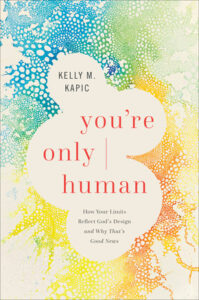 You’re Only Human: How Your Limits Reflect God’s Design and Why That’s Good News Kelly M. Kapic (Brazos Press) $24.99 OUR SALE PRICE = $19.99
You’re Only Human: How Your Limits Reflect God’s Design and Why That’s Good News Kelly M. Kapic (Brazos Press) $24.99 OUR SALE PRICE = $19.99
I’ve mentioned the word “creatureliness” in talking about Smith’s view of us as creatures who not only live certain places, but in particular times, upheld by God, always. This isn’t unusual, but it is a bit unusual to say and reflect upon. It’s a deep non-negotiable for Christians who have a solidly Biblical worldview; we are here, now, dependent, with limits. It’s the really real of the creation, how it’s meant to be. The internet and Tic Toc makes us seem as if we are connecting to “viewers” (with our “content”) all over the world, but there are constraints. Jesus was tempted severely before His ministry and even he renounced the demonic offer to control everything, to have it all. We cannot have it all.
This is a natural thing that even secularists at their best remind us of in the new year’s advice columns. We’ve got to be in touch with our limits; don’t forget to rest. We’re only human, they say.
Well, they are right. But to keep such a bromide from being an excuse for inappropriate living and, better, to evoke from it an intentionally Christian bit of enduring guidance, we need somebody who has really thought about this well.
Kelly Kapic is that guy. He is theologically rich (he teaches Reformed theology at Covenant College) and yet is not overly strict or ideological. He knows a bit about suffering (and has written widely about it.) He is encouraging, interesting, as he plumbs the depths of how good theology can shape our daily lives as well as anyone. As his subtitle puts it, our limits “reflect God’s design” and “that’s good news.” Really?
Need some gospel-centered good news that invites us to live in a Kingdom coming (but not of our own work?) Want to imagine your very bodies as places where God shows up? Want to think about finitude and embodiment that leads to a “joyful realism”? Do you need some of relief that comes from remembering that we are not God?
You’re Only Human offers us readers more than a framework, but a process. He invites us to embodied worship in a community with others where in freedom we can live well in our limited lives. I’m telling you, this is a great sort of book a wise and helpful book. Disability activist and scholar John Swinton calls it a “hopeful gift” and contemplative spiritual formation writer Ruth Haley Barton calls it an “uplifting work.” Karen Swallow Prior says “it’s a celebration of being human.” I know even our wallets are finite and for many of us, quite limited, but this is a book you really should get. Thanks, Dr. Kapic, for this very good news.
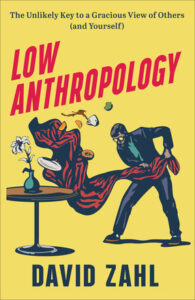 Low Anthropology: The Unlikely Key to a Gracious View of Others (and Yourself) David Zahl (Brazos Press) $26.99 OUR SALE PRICE = $21.59
Low Anthropology: The Unlikely Key to a Gracious View of Others (and Yourself) David Zahl (Brazos Press) $26.99 OUR SALE PRICE = $21.59
One last title in this peculiar list of books that offer a glimpse of being intentional as Christians this new year. I adore — as I have said — the practical edge of books like The Intentional Year: Simple Rhythms for Finding Freedom, Peace, and Purpose by Holly & Glenn Packiam, discussed above. Justin Whitmel Earley’s books (The Common Rule and Habits of the Household) offer helpful, cool insights into arranging our lives in new ways, making some life-giving hard choices and establishing some new patterns. Although Bob Goff may not see himself as a “self help” author, his practical (if hilarious and moving) stores guide us to live undistractedly. Yeah.
There are other good guides and helpful books of self improvement that we carry. Of course we do.
But while I’m not as stodgy as C.S. Lewis who said we must mostly read old books, I do worry about those who read only or mostly these breezy, practical guides to happier living. They have their place, and some are more thoughtful than others. But still.
So you can see that I’m ending this list with a book that is sort of an anti-self help book. It is really well written, fascinating, even. There are stories galore and helpful illustrative examples. Despite a rather weird cover, and a cleverly odd title, it’s a great book.
I love Nadia Bolz-Weber as a writer. Even when I disagree with her, I sometimes weep through her poignant, holy stories, and her deep care (and her breathtakingly good sentences.) Here is what she said about this conservative (Lutheran-ish?) writer and his new book:
This is the book I have been waiting for: an antidote to all the self-help nonsense that weighs down our bookshelves and our self-regard. I feel lighter, freer, and less alone with every word I read in Zahl’s brilliant and truthful Low Anthropology. — Nadia Bolz-Weber, author of Accidental Saints: Finding God in All the Wrong People
What is a low anthropology? I’m sure most readers can figure this out, but just in case, he does not mean “cultural anthropology” a la Margaret Mead and those who study other cultures. Anthropology is merely the term used to mean our view of the human person; as he points out, not the exotic sounding store of a similar-sounding name, either. Just your view of people.
Low? Well, it’s a hard sell for some, but yep. Zahl spends this whole page-turner of a book explaining why a high view of the human condition leads to disappointment. A lower (more realistic, informed by the Biblical doctrine of sin and fallenness I suppose) view keeps us from idolatry, positive thinking, over-promising, dreaming too big.
Here’s how the book marketeers put it, helpfully:
“Many of us spend our days feeling like we’re the only one with problems, while everyone else has their act together. But the sooner we realize that everyone struggles like we do, the sooner we can show grace to ourselves and others.
In Low Anthropology, author and theologian David Zahl explores how our ideas about human nature influence our expectations in friendship, work, marriage, and politics. He offers a liberating view of human nature, sin, and grace, showing why the good news of Christianity is both urgent and appealing.”
By embracing a more accurate view of human beings, we can discover a true and lasting hope.
So, this fascinating book cuts through the religious and inspirational noise inviting us to deep truths, truths already anticipated in Kapic’s Your Only Human. We aren’t all we’re cracked up to be and, frankly, that’s a good place to start.
Sure we need to be intentional about creating space for God; we need to hear the Packiams and their call to set aside time to refresh, replan, repent, even. God cares about all areas of our lives and we need to think seriously about what that looks like and how to “inhabit time.”
But let’s be realistic. Remember that buzz word, authentic? I’m not sure all that it means, but it at least means this much: we are sinners and God loves us anyway, ragamuffins that we all are. A low anthropology has vast implications, some of which Zahl explains in vivid detail. Others we can ponder ourselves, maybe for the rest of our lives. Low Anthropology is a game changer.
As the publisher said: “Many of us spend our days feeling like we’re the only one with problems, while everyone else has their act together. But the sooner we realize that everyone struggles like we do, the sooner we can show grace to ourselves and others.”
Here’s a great recommendation for the book by — get this — a self-help writer who wrote a book about time management. Ha. Here’s what he says about Zahl’s Low Anthropology:
A remarkably perceptive, funny, subversive, and nourishing book that hasn’t left my mind since I read it. David Zahl shows that transformation — and the kind of hope we can actually rely on — isn’t to be found in the oppressive perfectionism of self-improvement but rather in accepting the liberating truth that we’re all flawed, finite, prone to overconfidence and messing things up, and in need of forgiveness. — Oliver Burkeman, New York Times bestselling author of Four Thousand Weeks: Time Management for Mortals
TO PLACE AN ORDER
PLEASE READ AND THEN CLICK ON THE “ORDER HERE” LINK BELOW.
It is very helpful if you tell us how you prefer us to ship your orders.
The weight and destination of your package varies but you can use this as a quick, general guide:
There are generally two kinds of US Mail options, and, of course, UPS. If necessary, we can do overnight and other expedited methods, too. Just ask.
- United States Postal Service has the option called “Media Mail” which is cheapest but can be slow. For one typical book, usually, it’s about $3.69; 2 lbs would be $4.36.
- United States Postal Service has another option called “Priority Mail” which is $8.50, now, if it fits in a flat rate envelope. Many children’s books and some Bibles are oversized so that might take the next size up which is $9.20. “Priority Mail” gets much more attention than does “Media Mail” and is often just a few days to anywhere in the US.
- UPS Ground is reliable but varies by weight and distance and may take longer than USPS. We’re happy to figure out your options for you once we know what you want.
If you just want to say “cheapest” that is fine. If you are eager and don’t want the slowest method, do say so. It really helps us serve you well so let us know.
– DON’T FORGET TO LET US KNOW WHAT SHIPPING METHOD YOU PREFER –
BookNotes
SPECIAL
DISCOUNT
20% OFF
ALL BOOKS MENTIONED
+++
order here
this takes you to the secure Hearts & Minds order form page
just tell us what you want to order
inquire here
if you have questions or need more information
just ask us what you want to know
Hearts & Minds 234 East Main Street Dallastown PA 17313
read@heartsandmindsbooks.com
717-246-3333
So, COVID is not fully over. Since few are reporting their illnesses anymore, it is tricky to know the reality but the best measurement is to check the water tables to see the amount of virus in the eco-system. It’s still bad, and worsening. With flu and new stuff spreading, many hospitals are overwhelmed. It’s important to be particularly aware of how risks we take might effect the public good. It is complicated for us, so we are still closed for in-store browsing due to our commitment to public health (and the safety of our family, staff, and customers.) The vaccination rate here in York County is sadly lower than average. People are dying. Our store is a bit cramped without top-notch ventilation so we are trying to be wise. Thanks for understanding.
Please, wherever you are, do your best to be sensitive to those who are most at risk. Many of our friends, neighbors, co-workers, congregants, and family members may need to be protected since more than half of Americans (it seems) have medical reasons to worry about longer hazards from even seemingly mild COVID infections.
We are doing our famous curb-side and back yard customer service and can show any number of items to you if you call us from our back parking lot. It’s sort of fun, actually. We are eager to serve and grateful for your patience as we all work to mitigate the pandemic. We are very happy to help do if you are in the area, do stop by.
Of course, we’re happy to ship books anywhere. Just click on the link above.
We are here 10:00 – 6:00 EST / Monday – Saturday, closed on Sunday.

